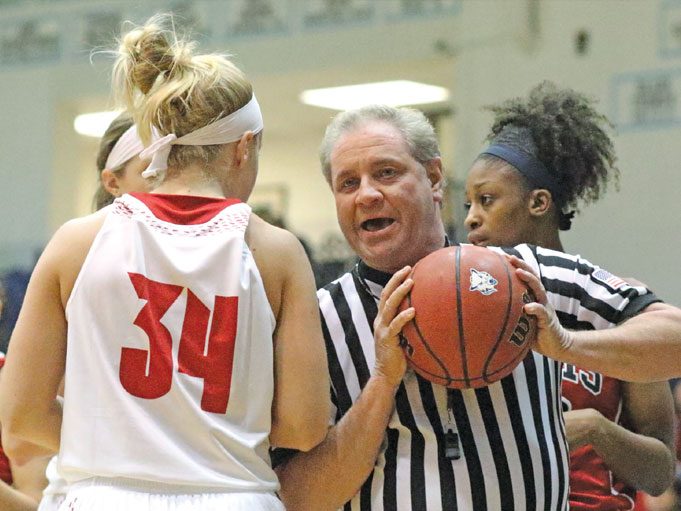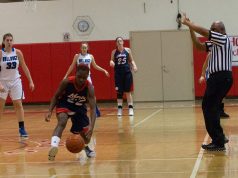When was the last time you heard someone say, “Consider the source”? That saying has been around for as long as one can remember, but what is the value to officials?
The fact is that beyond processing plays, rules and other dynamics of the game, we are constantly receiving information from participants within the game and those from outside, which can be useful, distracting and at times unreasonable.
An important skill for any sports official is being able to absorb the information, “consider the source” and then use our internal filter to keep meaningful data or delete the information as we quickly move to the next play.
As we move in-game, we will start from the outside-in. Often the loudest and most unreasonable information we hear is from nonparticipants, aka “fans.” First and foremost, we know that our interaction should be kept minimal, be professional and we should never engage in provocative or negative dialogue. Utilizing game management without direct interaction with the violator is always the best solution and can be defended by your supervisor. Many times fans will simply voice their displeasure without rising to the level of egregious behavior, and we must be able to filter, hit the delete button and quickly move on, not allowing it to become a distraction. By contrast, when dealing with players and coaches, an ability to directly communicate and articulate a clear and concise message is necessary for success. Being an active listener is the first step to effectively communicating. When a player or coach addresses you in a manner that is acceptable, listen without interruption and absorb the information they provide.
Next, begin to filter and process the real message behind their words. Is the coach simply venting frustration with you because his or her team is playing poorly, or is there merit behind the reason for approaching you? Is there a particular play or a series of plays in question?
By allowing ourselves a split second to process the information, we are now taking a moment to collect our thoughts, while sometimes reining in our emotions before we respond. Often, by the time we process what we hear, a simple non-verbal cue such as a nod of the head as if to say, “I hear you” is all that is required from our end.
Have you ever had a situation occur where you reacted before allowing yourself to process what you saw or heard? We all have, and often it does not end well. Sometimes thinking like a player or coach will allow us to place perspective on a situation and react in a way that is best for the game. Again, going back to our earlier thoughts on pregame preparations and getting to know our product and participants, does that individual, whether a player or coach, have a history of complaining recklessly or are they the type that, when they complain, we should listen?
It is important to note that it is a guideline and not as an absolute on how we handle that individual in that particular game. For instance, if a coach has a history of being unfair to officials but has been respectful so far that evening, we will show the same respect back.
Remember each game is a new day and our reason for pregame discussion is solely for the purpose of preparation so that we are not surprised.
What happens when a player or coach uses actions that disrespect the game or violate behavior/ unsporting decorum guidelines? Being an active listener or viewer first is the key to success.
After utilizing our internal filter and processing mechanism, take a moment and ask yourself the three-part test:
- Is a technical foul warranted?
- Is a technical foul effective?
- Can my immediate supervisor defend my actions?
If the answer to all three is yes, a technical foul is appropriate. If not, create time and distance, allowing the situation to defuse naturally. Being able to process the scenario quickly will be critical to an effective response. It is also important to remember that no two situations are exactly the same, and sometimes it requires us to place our ego aside, having selective hearing or vision within reason for the betterment of the game. By having total game awareness, we will be in a better frame of mind to make an appropriate decision that benefits all parties involved.
Understanding that the skill set of listening, filtering and processing, and responding is a continual work in progress is important in your expectations for yourself. No matter our experience level, we can continue to grow in that area. One of my favorite exercises to promote that development is to role-play with a group of peers, using in-game scenarios and dialogue that may occur. Many have implemented that into their study sessions or it is a great way to engage in useful time with your partners as you drive to your next game.
As in anything related to officiating, be better today than you were yesterday, minimizing your mistakes, learning from them and taking something away from the experience.
What's Your Call? Leave a Comment:
Note: This article is archival in nature. Rules, interpretations, mechanics, philosophies and other information may or may not be correct for the current year.
This article is the copyright of ©Referee Enterprises, Inc., and may not be republished in whole or in part online, in print or in any capacity without expressed written permission from Referee. The article is made available for educational use by individuals.


















